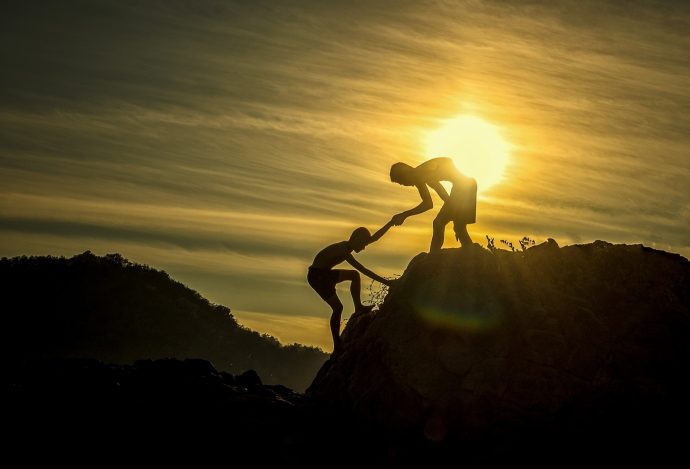In October 2019, we launched the first Impact Leadership Programme for our early career researchers. This is the first of its kind in a Cambridge college and epitomises the ethos, aspirations and strategic vision of Hughes Hall. Here we reflect on its objectives and hear from two of its first participants.
Hughes Hall PhD student, Robert Will, is one of the first Programme participants: “Hughes is a perfect place for me, from the modern forward-thinking attitude, to initiatives like the Bridge! I think we all want to be leaders in what we do in some way so building up those skills that aren’t necessarily part of our courses is a real benefit.”
The Impact Leadership Programme (ILP) builds a tangible bridge between research and practice using Hughes Hall’s strengths as an outward-facing College, and supports our ambitious research community who are keen to make a difference in the world. As a primarily post-graduate College with researchers working in highly translatable fields, we aim to maximise their potential. We want to go beyond the boundaries of a traditional education, initially helping our PhDs and Postdocs to make meaningful connections, develop the skills they will need to progress beyond the College gates, and, ultimately, fulfil their ambitions for the future. We do this in a number of ways, from bespoke training modules and inspiring events to work placements and mentoring.
Nicole Wheeler, a Hughes Hall Research Associate with a background in microbial genomics and machine learning, is one of the Programme’s first participants. She said: “I wanted to get more involved in the Cambridge ecosystem, and loved the Bridge initiative at Hughes. I applied to the ILP because I wanted to build my leadership skills to start my own academic group. I also wanted to gain some broader perspectives on how to build an impactful career.”
The ILP has been developed by Hughes By-Fellow, Dr Jimmy Chan: “I came across some information on City Fellows at Hughes Hall in 2017 and learnt about the Bridge programme. Both captured my imagination and resonated with my thoughts on how a Cambridge college could better engage the world and make a difference.” Jimmy has a 25-year background in international asset management.
Dr Anthony Freeling, President, said: “Expertise in business and entrepreneurship is a highly valuable resource for us and is critical as we develop the Bridge initiative and strive to translate some of the best thinking on the planet into the best solutions for all.”
Jimmy explained why the Programme interests him: “The Bridge at Hughes Hall has provided the perfect context, aspirations and motivation for the Impact Leadership Programme. Fundamentally, the Bridge is challenging us to turn our research and knowledge into something impactful for the world. This is a challenge to the Hughes Hall community, and a challenge to each of us individually.” The Programme aims to prepare participants to meet this challenge, with a very clear emphasis on practice.
The learning curriculum focuses on practical transferrable skills. Building on their current research skills, participants learn complementary skills needed to become an effective professional delivering results and impact, and then to multiply their individual impact through working with, and leading, others. They explore ways to forge an impactful professional life that aligns with their skills, values and passion. These concepts are packaged into 12 self-study modules and group workshops over seven months, punctuated by regular group discussion on the concepts in practice.
Through discussion events delivered by senior practitioners, participants learn different pathways to professional impact and draw inspirations from the speakers’ personal experience. Work placements at the end of year 1 will offer some hands-on practical exposure, followed by mentoring in years 2 and 3 to support the participants’ professional growth. Dr Chan explained “We are initially targeting PhDs in their second and third years, and Postdocs, so this doesn’t interfere with first-year viva or final-year thesis commitments. We are also prioritising participants from different disciplines and backgrounds, which will contribute to the group discussions and learning from one another.”
It is still early days – for the Programme itself and for the nine participants. Nicole Wheeler said: “So far the program has been very useful. The materials that have been picked out for us to review have been great food for thought, and the chance to discuss the material with other people also planning to step into leadership roles has led to some great insights. I hope I will learn to be a better leader, and mentor, and can think more broadly about what my career will be in the future and how I will create impact in my work.”
Robert Will agrees: “It’s been amazing! The course content has been really different to anything I’ve focussed on before, but the group is the highlight for me. Everyone is being really open and that has led to some interesting discussions. I hope the ILP will show me new ideas whilst also opening pathways to new careers that could be my future.”
The Bridge discussion event series began with a panel discussion in December, open to all, on the Cambridge Translational Ecosystem. You can read more about the event in this newsletter.
Nicole Wheeler reminds us: “There are a lot of different ways to achieve impact during your career. Some can be a major part of your job, others can be things that you participate in as a complement to your job, like public engagement or giving input on policy. Take advantage of the range of events and experiences available – you can’t really know if you’ll enjoy something or be good at it until you try it out.”
Indeed, the President has high hopes: “In ten years’ time, we will have changed the world for the better.” It is unique Programmes like this that can help to bring about that change.





